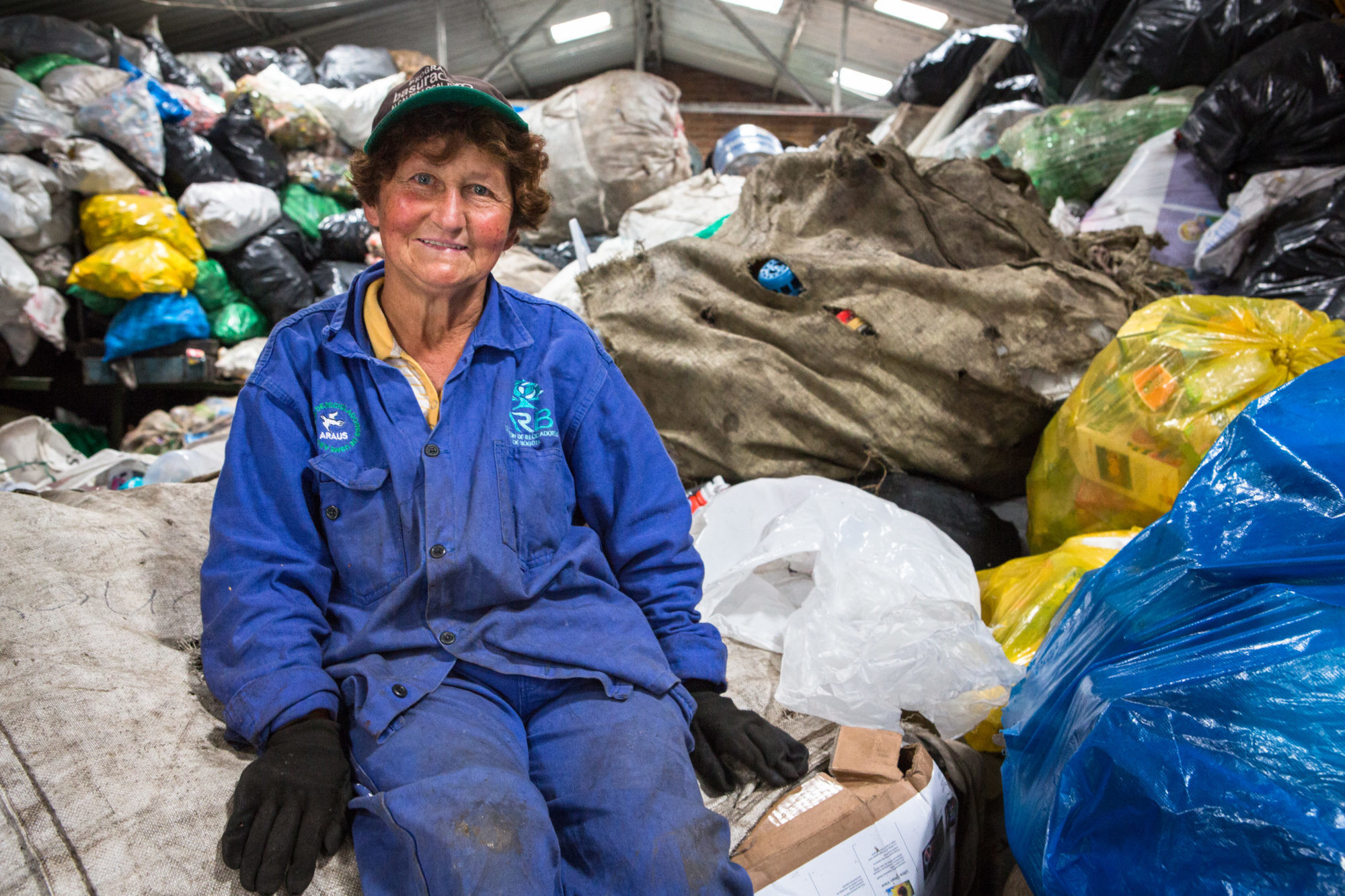It's time to give essential workers the protections they deserve

Ester Julia Olaya, a waste picker from Bogotá, Colombia Image: Juan Arredondo/Getty Images/Imag

Get involved with our crowdsourced digital platform to deliver impact at scale
Stay up to date:
Future of Work
- The world's essential workers have kept things running during the pandemic.
- But many still lack the protections they deserve, such as maternity pay, pensions or paid sickness leave.
- An upcoming summit, Essential for Recovery, will give these workers a voice and a space in which to address corporate and social leaders.
Justina Kgoele has been picking waste in South Africa for the last 25 years. Her income sustains her family, and her work helps to protect children in her community from picking up hazardous toxic waste. She works long hours for little pay, without a social safety net, and worked through the pandemic without protective equipment to prevent her from contracting the disease, or access to healthcare or vaccination.
In New York City, where I live, at the height of the COVID-19 pandemic there were around 2.5 million workers on the frontline, keeping the city running – often at risk to their own lives. But others found themselves out of a job in one of the world’s most expensive cities.
These days, at international fora like the World Economic Forum, I increasingly hear conversations on topics like social inclusion, empowerment, gender equality and racial justice. In these conversations, we discuss ‘purpose-driven business’, ‘conscious capitalism’, and how to assess the 'S' of ESG. I also see more women, people of colour, and more globally diverse webinar audiences in these zoom-filled times.
But how often do these conversations or webinars feature workers in conversation with CEOs or senior government officials? Why are Justina, the New York workers, and millions of others who perform essential but invisible roles – the backbone of the global economy –not at the table in discussions about resetting post-COVID economies?
Sobering facts
These workers – whether in the informal or formal sectors – are among the most poorly paid and undervalued in our economy: women on precarious or no contracts, domestic workers, waste-pickers, health and care workers, home-based workers, street vendors and agricultural workers.
They earn little but perform jobs that enable the rest of us to function, to survive and even to thrive. We’ve seen so many stories of courage, and resilience, especially during the pandemic, of workers keeping essential services running at real personal cost. Nightly, millions of people around the world engaged in recognition and appreciation of their labours, banging pots in unison – in New York City, every night at 7pm people would stop whatever it is they were doing and break out into applause, taking to their windows and balconies to thank the healthcare workers fighting the coronavirus outbreak.
People in India, Italy, Spain and many other countries paid similar tributes. Famous landmarks such as the Eiffel Tower displayed messages of thanks. Murals and other artworks honoured essential workers for their sacrifice.
But then the applause died as people moved on with their lives. The workers’ circumstances didn’t change, however. Low-paid and frontline workers remain most at risk of getting sick and dying from COVID-19. Notably, women workers have been the most impacted - they dominate healthcare and domestic roles, many unpaid.
Emerging global data continues to shock me:
- In 2020, almost 1.6 billion informal workers lost 60% of their income.
- Most workers in the informal economy are women, lacking social safety nets or benefits such as pensions, maternity pay or sickness leave. In Africa, almost 90% of working women work in the informal sector.
- The pandemic led to an alarming increase in gender-based violence in formal workplaces.
- One year into the pandemic, 52% of care workers said their pay did not allow them to adequately secure basic needs such as housing, food, and transportation.
Essential for recovery
On 8-10 September, these workers’ voices will be heard by CEOs, senior policy-makers, mayors, investors, artists, musicians, actors and social influencers in a series of conversations about the global reset. Workers from around the world will convene the first-ever global essential workers summit, to give visibility and voice to their collective leadership and their lived experiences. Some will share stories of their struggles for rights and dignity in work, and others will set out their vision for a just recovery in which their work is valued, protected and safe.
They belong to informal and formal sector worker organizations – Women in Informal Employment: Globalizing and Organizing (WIEGO), StreetNet International Alliance of Street Vendors,HomeNet International (HNI),International Domestic Workers Federation (IDWF), The Solidarity Center, International Trade Union Confederation (ITUC) and UNI Global Union.
The summit, titled Essential for Recovery, will present a series of short, powerful, visually exciting online events featuring the work of these organizations – Open Society Foundations partners – on their four-point agenda:
- Increased income and improved working conditions
- Healthy and safe workplaces and access to healthcare
- Social protection benefits
- Ending sexual harassment and violence at work
These corporate and social leaders will be listening, learning and talking – and committing to take meaningful actions to advance this agenda. We invite you to join this unprecedented and eye-opening summit.
As I think about Justina, I think about how differentially nations value this work. Most Nordic countries recognize the importance of a basic social infrastructure to enable people to thrive: social protection, decent incomes, healthy and safe workplaces are recognised as basic rights. In the US, the Biden administration is championing a social infrastructure package that includes quality, union jobs, and investments in the wellbeing of communities – including education, housing and the care that workers’ families need, such as child care, paid leave and long-term care. These are fundamental building blocks for any democratic society.
No more evening plaudits. We need to thank essential workers in a way that is meaningful, and lasting, that respects these basic needs and rights. Their demands are simple: they want to be seen, heard, treated with dignity and respect, and have their value recognized. This summit will inspire those of us with influence and resources to listen to them. I feel quite certain that those who do will see that seeing to their needs allows us to see to ours.
Don't miss any update on this topic
Create a free account and access your personalized content collection with our latest publications and analyses.
License and Republishing
World Economic Forum articles may be republished in accordance with the Creative Commons Attribution-NonCommercial-NoDerivatives 4.0 International Public License, and in accordance with our Terms of Use.
The views expressed in this article are those of the author alone and not the World Economic Forum.
Related topics:
The Agenda Weekly
A weekly update of the most important issues driving the global agenda
You can unsubscribe at any time using the link in our emails. For more details, review our privacy policy.
More on Future of WorkSee all
Andrea Willige
February 29, 2024
Kara Baskin
February 22, 2024
Stephen Hall and Rebecca Geldard
February 19, 2024
Jason Walker and Deborah Circo
February 12, 2024







